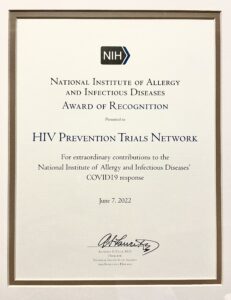
The 2022 HPTN Annual Meeting took place June 5-8 in Washington, D.C., bringing hundreds of worldwide researchers, collaborators, community representatives, and government health officials together to share updates and accomplishments and re-engage with each other as a community.
HPTN Principal Investigators Myron Cohen, MD, director of the UNC Institute for Global Health & Infectious Diseases (IGHID), and Wafaa El-Sadir, MD, MPH, welcomed attendees back to an in-person meeting and expressed appreciation for the continued support of the HPTN’s ongoing research agenda to end the global HIV epidemic.
 HPTN also received special recognition for groundbreaking work on COVID-19 prevention tools. NIAID Director Anthony Fauci, MD, presented an award to Cohen and El-Sadir, commending the network’s response to the global pandemic.
HPTN also received special recognition for groundbreaking work on COVID-19 prevention tools. NIAID Director Anthony Fauci, MD, presented an award to Cohen and El-Sadir, commending the network’s response to the global pandemic.
The four-day meeting addressed several key topics, including long-acting biomedical PrEP interventions, integrated HIV prevention strategies and global HIV/AIDS research priorities. It also addressed communications and messaging strategies to enhance study recruitment and retention, multipurpose prevention technologies, mRNA technology as it relates to HIV vaccine development, and COVID-19’s impact on HIV prevention, treatment, and research.
Other IGHID members who provide HPTN working group leadership include Audrey Pettifor, PhD, chairing Adolescents at Risk, Ada Adimora, MD, MPH, chairing Women at Risk, and Joe Eron, co-chairing Biomedical Sciences.
The HIV Prevention Trials Network (HPTN) is a worldwide collaborative clinical trials network that brings together investigators, ethicists, community and other partners to develop and test the safety and efficacy of interventions designed to prevent the acquisition and transmission of HIV. HPTN studies evaluate new HIV prevention interventions and strategies in populations and geographical regions that bear a disproportionate burden of infection. Learn more.
